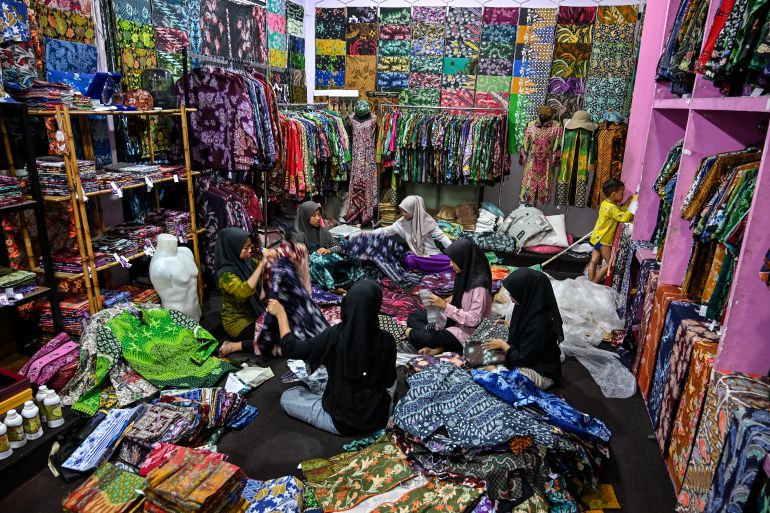Indonesia eyes hefty tariffs on China as businesses decry cheap imports
Jakarta is proposing 200 percent tariffs on Chinese goods, citing the United States’ policies as an inspiration.
Students and workers arrange traditional clothing at a gallery in the Sari Kenongo workshop in Sidoarjo during Indonesia’s National Batik Day on October 2, 2024 [Juni Kriswanto/ AFP]By Aisyah LlewellynPublished On 11 Oct 202411 Oct 2024
Medan, Indonesia – Siti Faiza has run Faiza’s Production House, a traditional women’s wear business, in Solo, Central Java since 2008.
Faiza started her business as a university student, designing and sewing garments herself at home.
When sales began to take off, Faiza recruited some of her neighbours to help scale up the business. Today, Faiza’s Production House employs 12 tailors.
Still, Faiza says it is a struggle to compete with cheaper garments imported from overseas, particularly China.
“Sometimes I see imported clothes online at such low prices, like 40,000 rupiah ($2.65). That would not even cover the cost of my fabric and I always wonder how the prices can be so low,” Faiza told Al Jazeera.
Indonesia’s government has noted complaints by small-business owners such as Faiza, proposing tariffs of up to 200 percent on Chinese imports.
Minister of Trade Zulkifli Hasan has claimed that a flood of Chinese products into the local market due to the US-China trade war is threatening small businesses with “collapse”.
“I absolutely support the tariffs and actually think that we should reject imports completely because they are destroying local businesses,” Faiza’s husband Indrawan told Al Jazeera.
“Indonesia already has a large local textile market. Why do we have to import anything?”
In June, thousands of workers in Jakarta protested against Chinese imports, prompting Hasan to propose tariffs to protect the country’s estimated 64 million micro-, small and medium-sized enterprises (MSMEs).
“The United States can impose a 200-percent tariff on imported ceramics or clothes; we can do it as well to ensure our MSMEs and industries will survive and thrive,” Zulkifli said in remarks to local media.
Indonesia’s Trade Minister Zulkifli Hasan attends the launch of social media video sharing app TikTok and Indonesia’s leading e-commerce site Tokopedia’s Buy Local Campaign in Jakarta on December 12, 2023 [Yasuyoshi Chiba/AFP]
The proposed tariffs would affect a wide range of goods, from footwear and clothing to cosmetics and ceramics.
China is Indonesia’s biggest trading partner, with two-way trade last year topping $127bn, meaning the proposed tariffs could have a significant effect on not just the economy but relations between Jakarta and Beijing.
Jakarta has a history of intervening in the economy, the largest in Southeast Asia with a gross domestic product of more than $1.3 trillion, to support local industry.
Under outgoing President Joko “Jokowi” Widodo, who set the ambitious goal of raising gross domestic product (GDP) per capita to $25,000 by 2045, Jakarta has pursued a model of “new developmentalism” that aims to foster rapid economic growth while shielding local businesses from competition, said Ian Wilson, a lecturer in politics and security studies at Perth’s Murdoch University.
“Southeast Asian style developmentalism is a well-known model beginning in the 1970s with a high degree of government intervention in the economy overseeing a transition of labour, output, and exports away from low productivity agriculture towards higher productivity manufacturing sector and industrialisation,” Wilson told Al Jazeera.
“The immediate question, however, is what is the calculation in imposing tariffs of this kind?”
While the proposed tariffs have been enthusiastically supported by many local businesses, economists have sounded a cautious note about the broader effects of such measures.
Siwage Dharma Negara, a senior fellow at the ISEAS-Yusof Ishak Institute in Singapore, said tariffs should be considered carefully.
“Just reducing imports may not be an ideal goal. We need imports for raw materials and local industrial materials and, if tariffs are imposed, these industries will be affected,” he told Al Jazeera.
Negara said the government should place emphasis on supporting the growth of local businesses in addition to curbing imported goods.
“Businesses need to be helped to be more efficient and grow stronger, and for this the government needs to provide clear targets,” he said.
The tariffs proposal also marks a contrast with Jakarta’s generally warm relations with Beijing, which has spearheaded dozens of infrastructure projects in the country under the banner of its Belt and Road Initiative.
Following the announcement of the proposed tariffs, Chinese Foreign Ministry spokesman Lin Jian said Beijing was monitoring the situation.
“China will closely follow possible safeguard tariffs Indonesia may impose on specific products, and take necessary measures to safeguard the legitimate rights and interests of Chinese companies,” Lin said.
Dump trucks manoeuvre at Indonesia Weda Bay Industrial Park at Central Halmahera, North Maluku province, Indonesia on June 8, 2024 [Achmad Ibrahim/AP]
Trissia Wijaya, a senior research fellow at Ritsumeikan University in Kyoto, Japan, said she did not think the planned tariffs would have a major effect on Indonesia-China economic cooperation overall.
“This can be traced back to the real mainstay of our relationship over the past few years, which is critical mineral trade volume, in which China absorbed more than 80 percent of our nickel output,” Wijaya told Al Jazeera.
“The nickel supply is pivotal for China’s strategic interests. As long as the mainstay is not destroyed, I don’t think it would infuriate Beijing either as it is applicable to textiles, ceramics, and electronics.”
Back in Solo, Faiza is not holding out hope that tariffs will be the solution to her business struggles.
“It is a free market nowadays, so whether we want to accept imported goods or not, we now live in an online world where people can buy anything they want,” she said.
“The key for me is how I can make my products better and justify the higher prices. We need to be innovative and protect our quality. It is hopeless to fight against imports.”
